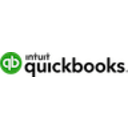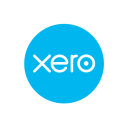Zoho Books vs QuickBooks: Which tool should I choose?
- 01Zoho Books vs QuickBooks: overview
- 02What's the difference between Zoho Books and QuickBooks?
- 03Zoho Books pros and cons
- 04QuickBooks pros and cons
- 05Zoho Books compared to QuickBooks
- 06QuickBooks compared to Zoho Books
- 07Features comparison
- 08Zoho Books vs QuickBooks: Which is the best for your business?
- 09Promotions on Accounting software
- 10Alternatives to Zoho Books & QuickBooks
Access up to $100 savings on Zoho Books & $352 on QuickBooks
Access up to $100 savings on Zoho Books & $352 on QuickBooks
You need to manage your start-up's accounts in the best possible way to ensure your financial stability and keep track of day-to-day operations. That's why it's essential to buy high-performance, reliable accounting software. That way, you can concentrate on what's really important: running your business.
There are two well-known names to consider when making your choice: Zoho Books and QuickBooks. So that you can select the best tool for your business, we offer you a Zoho Books vs QuickBooks comparison. In it, we assess the differences and features of the two platforms in detail.
Zoho Books vs QuickBooks: overview
Zoho Books and QuickBooks stand out as leading contenders in the realm of accounting and financial management software, each catering to distinct business needs with their unique strengths.
Zoho Books is well-regarded for its holistic approach, presenting users with an integrated suite of applications that cover not just accounting but also CRM and project management. On the other hand, QuickBooks shines as a dedicated accounting and financial management solution, making it a top choice, particularly for small to mid-sized businesses seeking robust bookkeeping and precise financial tracking tools.
To make an informed decision regarding the ideal accounting and financial management software for your business, let's delve into the specific comparison of Zoho Books vs QuickBooks, considering your unique business requirements.
What's the difference between Zoho Books and QuickBooks?
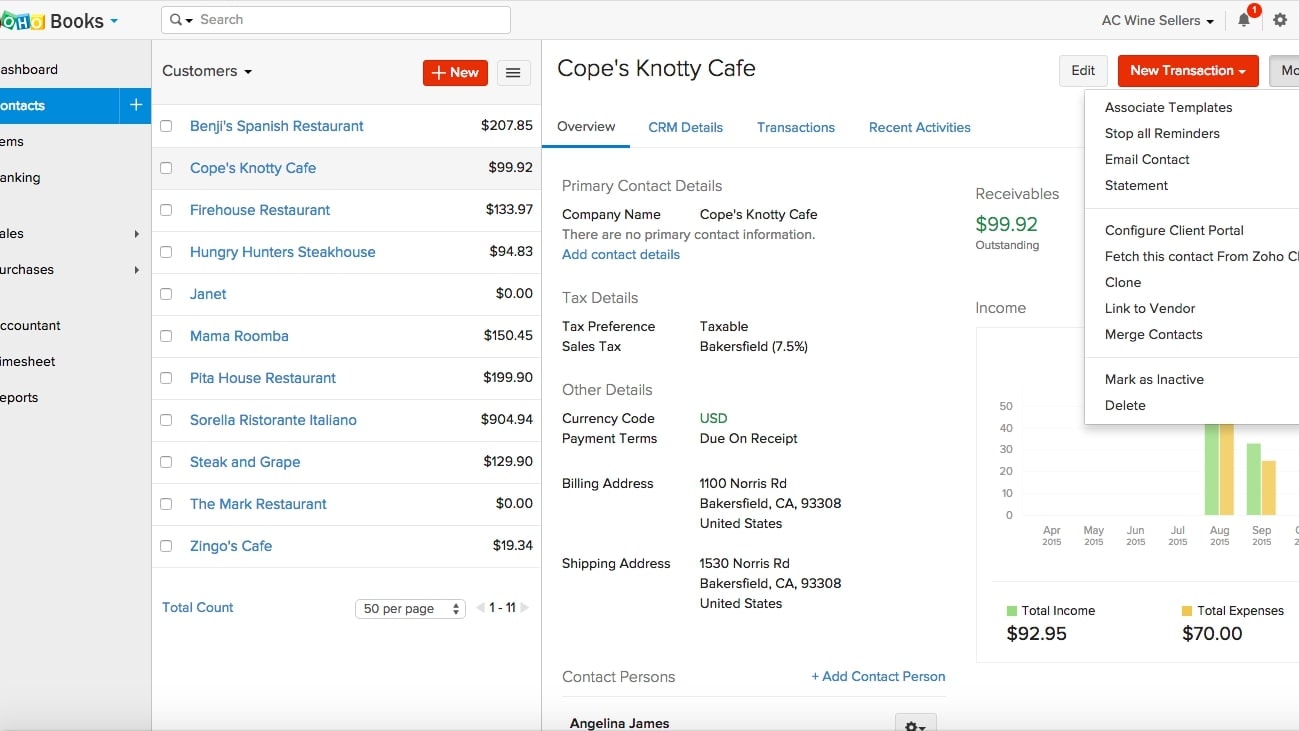

When comparing the two tools, Zoho Books and Quickbooks, it is difficult to identify a single main difference. In fact, while the two accounting platforms offer relatively similar and comprehensive functionality, they differ in two main respects. The first difference is that Zoho Books really comes into its own when integrated with the other software offered by Zoho. The second difference is the target audience. This is because while Zoho Books is perfect for smaller businesses that don't have time to waste, Quickbook is relevant for businesses that are starting to grow. Let's find out more about this together.
Let's go back to the first difference: integrations. Quickbooks offers over 650 integrations with third-party software. As a result, the tool integrates easily with existing business workflows. Zoho, on the other hand, offers a much smaller number of third-party integrations. However, this accounting software interfaces seamlessly with tools such as Zoho Workplace, Zoho CRM Plus, Zoho People Plus and Zoho Expense. In other words, if you're a regular user of Zoho solutions, we recommend you opt for Zoho Books, as you'll be able to take full advantage of it.
Furthermore, it's true that both Zoho Books and Quickbooks are perfectly suited to small and medium-sized businesses. Their prices are affordable and the ergonomics are pleasant. However, Zoho Books offers a free package. This is attractive because it allows you to send up to 1,000 invoices a year. In other words, it's ideal for start-ups that can't afford to spend a lot. They'll be able to take advantage of this comprehensive free package. In addition, the number of users included by Zoho Books is between 1 and 15, compared with 1 to 25 for Quickbooks. This demonstrates once again that Zoho Books is the ideal choice for small teams.

$100 in Zoho Wallet credits on Zoho Books
Get $100 in Zoho Wallet credits on Zoho Books and up to $100 savings with Secret.
Zoho Books pros and cons
What are the advantages of Zoho Books?
- Comprehensive accounting suite: Zoho Books offers a comprehensive suite of accounting tools, including invoicing, expense tracking, inventory management, and financial reporting, providing businesses with all the necessary features to manage their finances effectively.
- User-friendly interface: The software is known for its user-friendly interface, making it accessible to users with varying levels of accounting expertise. This ease of use can save time and reduce the learning curve for employees.
- Integration capabilities: Zoho Books seamlessly integrates with other Zoho applications and a wide range of third-party software, allowing businesses to create a customized software ecosystem that suits their specific needs.
- Mobile accessibility: Zoho Books offers mobile apps for both iOS and Android devices, enabling users to manage their finances on the go, making it a convenient option for businesses with remote or on-the-move operations.
- Affordability: Zoho Books is competitively priced, particularly for small and medium-sized businesses, making it a cost-effective choice for those looking for robust accounting software without breaking the bank.
What are the disadvantages of Zoho Books?
- Limited advanced features: While Zoho Books is suitable for many businesses, it may lack some advanced accounting features that larger or more complex organizations require, such as multi-entity support or advanced payroll management.
- Customer support: Some users have reported mixed experiences with Zoho's customer support, with occasional delays or difficulties in getting timely assistance.
- Scalability: While it's excellent for small to medium-sized businesses, Zoho Books may face limitations in scalability for larger enterprises with more complex financial needs.
- Learning curve for new users: Despite its user-friendly design, new users may still face a learning curve, especially if they are not familiar with accounting terminology and processes.
- Offline functionality: Zoho Books relies heavily on an internet connection, and offline functionality is limited. This can be a drawback in areas with unreliable or slow internet access.
Compare Zoho Books to other tools
QuickBooks pros and cons
What are the advantages of QuickBooks?
- User-friendly: QuickBooks is known for its user-friendly interface, making it accessible to individuals with limited accounting knowledge.
- Comprehensive accounting: It offers a wide range of accounting features, including invoicing, expense tracking, payroll management, and financial reporting.
- Integration: QuickBooks integrates with numerous third-party applications, allowing businesses to customize and expand their accounting software's functionality.
- Scalability: QuickBooks offers different versions tailored to various business sizes, from sole proprietors to larger enterprises, ensuring scalability.
- Strong support: QuickBooks provides robust customer support, including online resources, a community forum, and customer service options.
What are the disadvantages of QuickBooks?
- Cost: Depending on the version and add-ons, QuickBooks can be relatively expensive, which may be a drawback for small businesses with tight budgets.
- Learning curve: While user-friendly, QuickBooks can still have a learning curve, especially for complex accounting tasks or advanced features.
- Limited multi-user capabilities: Some versions of QuickBooks have limitations when it comes to multiple users accessing the software simultaneously.
- Data file size: The size of the QuickBooks data file can become an issue over time, particularly for larger businesses, potentially leading to performance problems.
- Industry-specific features: While QuickBooks can be customized, it may lack certain industry-specific features that businesses in niche markets require.
Compare QuickBooks to other tools
Zoho Books compared to QuickBooks
When it comes to comparing Zoho Books and QuickBooks, Zoho Books stands out for its versatility and affordability, making it an attractive choice for businesses in search of comprehensive accounting and financial management solutions. Zoho's pricing options, including competitive plans and a free trial, accommodate a broad spectrum of businesses, from startups to well-established enterprises, all seeking to optimize their financial operations without stretching their budget.
Both Zoho Books and QuickBooks excel in enhancing financial efficiency, but the decision between the two hinges on your specific needs. Zoho Books offers a cost-effective solution with a focus on flexibility and customization, making it particularly well-suited for businesses aiming to streamline their financial processes and adapt to ever-changing requirements.
Is Zoho Books better than QuickBooks?
The decision of whether Zoho is better than QuickBooks ultimately depends on your unique accounting and financial management needs. Zoho Books offers a versatile and cost-effective option, featuring a user-friendly interface and a comprehensive suite of applications designed to cater to a variety of business sizes and industries. It allows for extensive customization and offers integration capabilities to adapt to diverse workflows, making it suitable for businesses with evolving financial requirements.
Zoho emphasizes adaptability and affordability, while QuickBooks specializes in accounting and financial management. QuickBooks is particularly advantageous for small to medium-sized enterprises and offers a deep set of accounting features, including robust reporting and payroll management, making it an excellent choice for those prioritizing precise financial tracking and analysis.
What is Zoho Books best used for?
Zoho Books is a key component of the versatile suite of Zoho business applications, designed to support various facets of business operations. Its primary strengths revolve around providing an integrated platform for managing customer relationships, streamlining accounting and financial processes, enhancing project management, and facilitating collaboration among teams.
Zoho's adaptability and scalability make it a valuable resource for businesses across different industries, helping them streamline operations and achieve greater efficiency in their day-to-day tasks. Whether you run a small business, a growing startup, or a well-established enterprise, Zoho Books and its suite of applications can be tailored to meet your specific needs, making it a versatile and valuable asset for your business.
Can Zoho Books replace QuickBooks?
Zoho offers a comprehensive suite of business applications, including accounting software, which can serve as a viable alternative to QuickBooks for many businesses.
Zoho Books’s software provides essential features such as invoicing, expense tracking, financial reporting, and payroll management. It's particularly well-suited for small to medium-sized businesses looking for a cost-effective and user-friendly solution to manage their finances. However, it's important to note that while Zoho can replace QuickBooks for many businesses, QuickBooks remains a specialized accounting software with a deep focus on financial management, particularly for larger enterprises with complex financial needs.
Is Zoho Books cheaper than QuickBooks?
When evaluating the cost of Zoho and QuickBooks, there are distinct pricing variations worth considering. Zoho Books’s pricing options provides a cost-effective alternative with a range of subscription plans tailored to different business sizes and needs. It offers competitive pricing options, including a free trial, making it a budget-friendly choice for many businesses, especially startups and small enterprises.
On the other hand, QuickBooks generally tends to have a higher price point, which can be a significant factor for businesses operating on a tight budget. Zoho's pricing flexibility may make it a more cost-effective choice for businesses looking to optimize their financial management without overspending.
Is there a better Accounting software than Zoho Books?
While Zoho Books is a comprehensive business application, it's worth exploring whether there might be a more suitable software for your specific needs.
There are several noteworthy alternatives to Zoho Books in the world of accounting and financial management software, including QuickBooks, Wave, FreshBooks, and Xero.
The choice of software depends on various factors, such as the size of your company, industry-specific requirements, and budget constraints. While Zoho Books offers a wide range of applications for various business functions, alternative software solutions may specialize in specific areas or provide a different pricing structure that better aligns with your business objectives.
$100 in Zoho Wallet credits on Zoho Books
Get $100 in Zoho Wallet credits on Zoho Books and up to $100 savings with Secret.
QuickBooks compared to Zoho Books
QuickBooks distinguishes itself with its specialization in accounting and financial management, positioning it as the go-to choice for businesses focused on precise financial tracking and comprehensive reporting. QuickBooks's pricing structure, though offering various plans, is often more aligned with the needs of small to medium-sized enterprises seeking robust financial solutions.
While both QuickBooks and Zoho Books excel in financial management, the decision between the two hinges on your specific requirements. QuickBooks shines as the preferred option for businesses necessitating in-depth accounting features, sophisticated payroll management, and advanced financial reporting capabilities.
Is QuickBooks better than Zoho Books?
Determining whether QuickBooks is superior to Zoho Books hinges on the specific accounting and financial management needs of your business. QuickBooks stands out by offering a specialized and comprehensive suite of accounting tools, making it an excellent fit for businesses that prioritize precise financial tracking, in-depth reporting, and comprehensive payroll management.
The choice between QuickBooks and Zoho Books ultimately depends on factors such as the size of your business, industry-specific requirements, and the extent to which you require specialized accounting features. While QuickBooks provides extensive accounting capabilities, Zoho Books takes a more holistic approach to business management, offering a broader suite of applications that go beyond accounting.
What is QuickBooks best used for?
QuickBooks excels as a specialized accounting and financial management tool designed primarily for businesses and organizations of varying sizes. It is an ideal choice for businesses seeking to efficiently manage their financial transactions, invoicing, expense tracking, payroll processing, and overall financial health.
QuickBooks's strengths lie in its comprehensive set of accounting features, including double-entry accounting, financial reporting, tax preparation, and budgeting capabilities. It is invaluable for businesses requiring precise financial tracking, compliance with tax regulations, and detailed financial reporting. Its specialization in accounting and financial management makes it an essential tool for businesses aiming to streamline their financial operations, ensure accuracy in their financial records, and make informed financial decisions to support growth and stability.
Can QuickBooks replace Zoho Books?
QuickBooks has the potential to replace Zoho Books, but this decision depends on your specific business's accounting and financial management requirements. QuickBooks is a specialized accounting software known for providing comprehensive solutions for financial tracking, reporting, and management.
If your primary focus is on precise financial accounting, payroll processing, tax compliance, and advanced financial reporting, QuickBooks' specialization in these areas may make it a suitable replacement for Zoho's accounting features. However, it's crucial to consider how this decision aligns with your broader business objectives. Zoho Books offers a more holistic approach to business management, encompassing CRM, project management, and collaboration tools, among others.
Is QuickBooks cheaper than Zoho Books?
When comparing the cost of QuickBooks to Zoho Books, there are notable differences in pricing structures that warrant consideration. QuickBooks’s pricing model may be perceived as higher, particularly for businesses with more extensive financial management requirements, as it offers advanced features and capabilities that cater to these needs.
In contrast, Zoho Books presents a more cost-effective alternative, offering a range of pricing plans tailored to various business sizes and requirements. Zoho's competitive pricing options, including affordable plans and a free trial, ensure accessibility for startups, small businesses, and enterprises alike. This affordability makes Zoho Books an appealing budget-friendly choice for many users seeking comprehensive business applications without exceeding their financial constraints.
Is there a better Accounting software than QuickBooks?
QuickBooks is a powerful accounting and financial management software, but it's crucial to explore whether there might be a more suitable solution for your specific financial requirements.
Several noteworthy alternatives to QuickBooks in the accounting and financial management realm include Zoho Books, Xero, Freshbooks, and Synder.
The choice of accounting software depends on factors such as the complexity of your financial needs, budget constraints, and industry-specific requirements. While QuickBooks offers comprehensive accounting features, other software solutions may cater better to your specific business context or provide a different pricing structure that aligns more closely with your financial objectives.
50% off QuickBooks Online for 3 months on QuickBooks
Get 50% off QuickBooks Online for 3 months on QuickBooks and up to $352 savings with Secret.
Features comparison
Zoho Outperforms QuickBooks in Multi-Currency Support

Zoho Books stands out as a powerful solution for businesses engaged in global operations, demonstrating its prowess in handling transactions across multiple currencies. This capability proves invaluable for companies with international clients or a global footprint. For instance, if you're a business that sells products or services internationally, Zoho Books empowers you to seamlessly invoice clients in their local currency, simplifying transactions and enhancing customer satisfaction.
On the other hand, QuickBooks doesn't prominently feature multi-currency support in its primary offerings. This limitation may restrict its versatility for businesses engaged in international transactions, potentially leading to challenges in managing foreign currency accounts, exchange rate adjustments, and precise financial tracking across borders.
QuickBooks Provides a More Extensive Integration Library Compared to Zoho

When evaluating integration capabilities, QuickBooks takes the lead. Its extensive support for third-party applications, spanning ecommerce sales platforms to customer relationship management (CRM) systems, ensures a highly connected and adaptable system. For instance, QuickBooks seamlessly integrates with popular apps like Shopify, Squarespace and Etsy for effective order, product and inventory management.
This adaptability allows QuickBooks to easily align with an existing business framework, enhancing workflow efficiency. In contrast, Zoho Books primarily focuses on integrating within its suite of business applications. While this is convenient for users already utilizing Zoho's ecosystem, it may feel limiting when attempting to connect with a diverse range of external tools, such as CRM systems or e-commerce platforms.
QuickBooks Provides More Advanced Cash Flow and Forecasting Features than Zoho Books
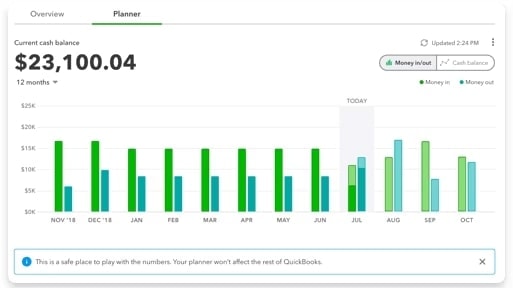
QuickBooks takes a significant lead in providing businesses with real-time visibility of their cash flow by securely connecting to their bank accounts, allowing users to access a dynamic cash flow forecast. This feature proves to be an invaluable asset for businesses, enabling them to plan and manage their finances effectively. For instance, QuickBooks can show you a projected cash flow based on your upcoming income and expenses, helping you make informed financial decisions.
While Zoho Books offers comprehensive financial reporting, including the generation of cash flow statements, it does not explicitly highlight real-time cash flow tracking and forecasting, a feature that QuickBooks excels in. This real-time capability in QuickBooks empowers businesses to have a more immediate and precise grasp of their financial health, making it a preferred choice for those seeking enhanced financial planning and control.
Zoho Books Takes the Lead Ahead of QuickBooks for User-Friendliness
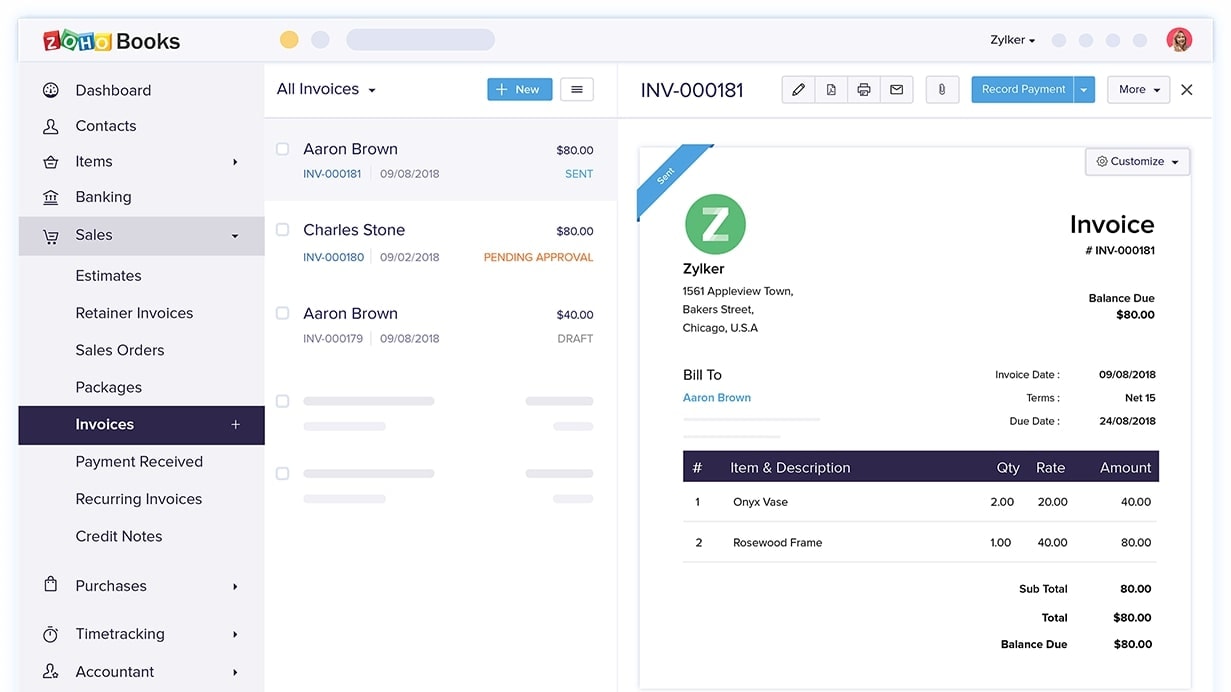
While both Zoho Books and QuickBooks prioritize user-friendliness, Zoho Books shines with its exceptional ease-of-use. Its clear and intuitive interface sets it apart, ensuring even users new to accounting software can navigate it effortlessly. For instance, when creating an invoice in Zoho Books, users can simply input customer details, add line items, and send it within minutes.
In contrast, QuickBooks, though powerful, may appear daunting to beginners due to its extensive feature set. For instance, QuickBooks offers advanced inventory management, which can be overwhelming for small businesses with limited inventory needs.
Zoho Books is Superior for Invoicing Compared to QuickBooks

Zoho Books excels in the realm of invoicing thanks to its user-friendly interface and extensive customization capabilities. Its intuitive design streamlines the process of creating professional invoices while offering ample room for personalization to align with your brand identity. For instance, Zoho Books allows you to easily add your company logo and customize the color scheme to match your branding guidelines.
Moreover, Zoho Books provides versatile options for sending invoices to clients, supporting various formats such as PDFs and HTML, and offering online payment integration to expedite the payment process. In contrast, while QuickBooks enables personalized invoice creation and tracking, it lacks the granular customization and versatility in invoice formatting provided by Zoho Books, which can be especially beneficial for businesses aiming to maintain a consistent and polished brand image across all financial documents.
QuickBooks Offers Better Automation in Tax Calculations than Zoho Books
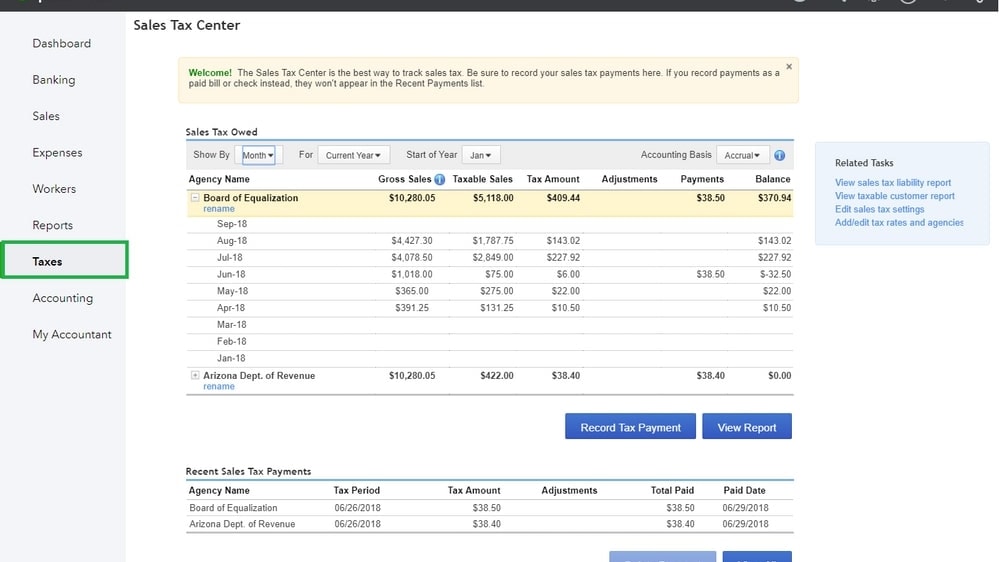
QuickBooks excels in simplifying tax management by automatically calculating taxes on various financial transactions, including purchases, sales, and payrolls. This automation significantly reduces the burden of manual tax calculations, minimizing the risk of errors. For instance, QuickBooks can automatically apply the correct sales tax rate based on your location and the type of product or service sold, ensuring compliance with tax regulations.
In contrast, while Zoho Books is a robust accounting tool, it does not emphasize automated tax calculation as a standalone feature. Users may need to manually input and calculate taxes, which can be time-consuming and increase the potential for errors, particularly for businesses dealing with complex tax regulations or operating in multiple tax jurisdictions.
Both Zoho Books and QuickBooks have an Equal Emphasis on Collaboration
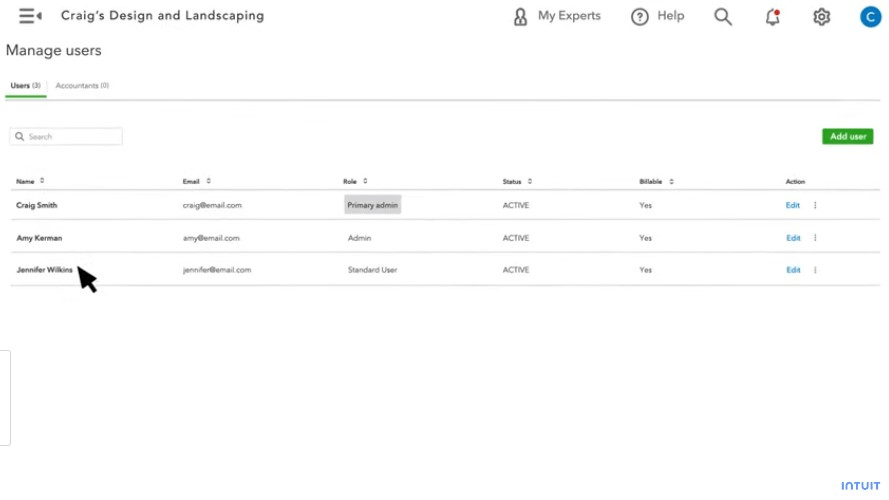
Both Zoho Books and QuickBooks prioritize collaboration features, enhancing teamwork and efficient financial management. Zoho Books enables seamless collaboration by granting controlled access to team members, accountants, or financial advisors, allowing them to work collaboratively while maintaining data security. For example, your accountant can access the necessary financial information to provide you with accurate advice and insights.
Likewise, QuickBooks offers a platform for streamlined collaboration with your accountant directly within their platform. This feature promotes real-time communication, enabling you to share financial data, receive guidance, and address financial challenges promptly.
Subscribe to our newsletters.
No FOMO here. Stay up-to-date on all the latest deals and news with our monthly newsletter straight to your inbox like 126,000+ entrepreneurs (+ Get 10% off on on our Premium Membership!)
Zoho Books vs QuickBooks: Which is the best for your business?
Zoho Books is the best tool for you if:
- You run a small or medium-sized business seeking affordable and user-friendly accounting software
- You value customization and integration capabilities to tailor the software to your unique financial workflows
- You require essential accounting features like invoicing, expense tracking, and financial reporting
- You want a holistic business management solution that can seamlessly integrate with other Zoho applications
- You prioritize cost-effectiveness without compromising on essential financial management features
QuickBooks is the best tool for you if:
- You need efficient financial management, offering features like invoicing, expense tracking, and financial reporting for businesses of all sizes
- Tax compliance is crucial; QuickBooks excels in automating tax calculations, deductions, and filings, saving time and reducing errors
- You prefer user-friendly accounting software; its intuitive interface and comprehensive tutorials make financial tasks accessible to non-accountants
- Integration with other business tools is essential; QuickBooks seamlessly connects with various apps and services, streamlining workflow
- You seek industry-specific solutions; QuickBooks offers tailored versions for contractors, retailers, nonprofits, and more, addressing unique business needs effectively

$100 in Zoho Wallet credits on Zoho Books
Get $100 in Zoho Wallet credits on Zoho Books and up to $100 savings with Secret.
Alternatives to Zoho Books & QuickBooks
Promotions on Accounting software
Start saving on the best SaaS with Secret.
Secret has already helped tens of thousands of startups save millions on the best SaaS like Zoho Books, QuickBooks & many more. Join Secret now to buy software the smart way.







